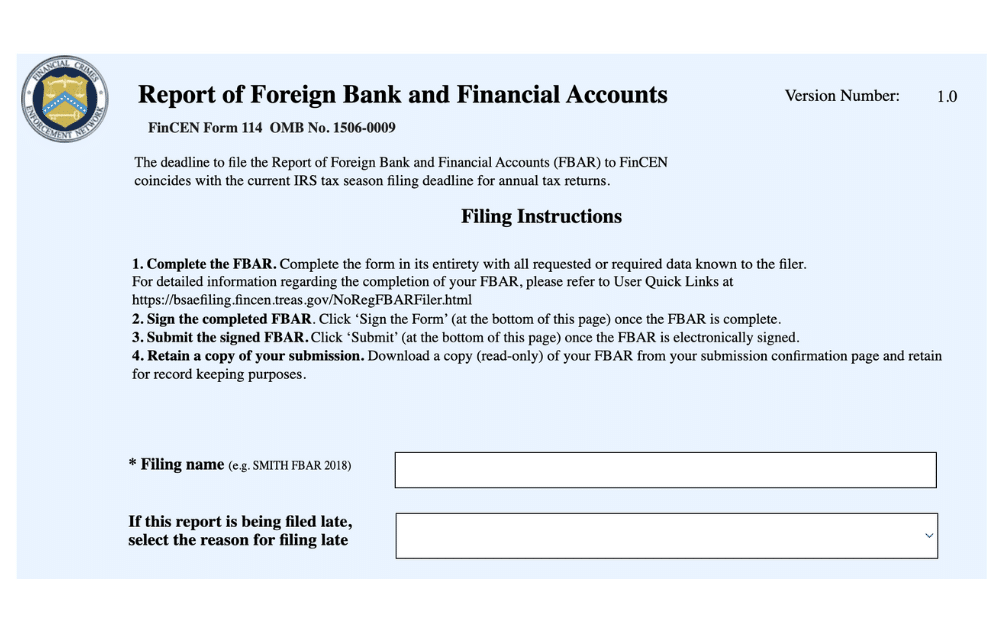2026 U.S. Tax Filing Deadlines for Americans Living Abroad

- When Do I File My 2025 Tax Return?
- 2025 Tax Year Deadline Calendar for U.S. Expats Filing in 2026
- International Reporting Form Deadlines (2025 Tax Year)
- Will I Owe Taxes on My 2025 Income?
- Do I Need to Make Quarterly Payments?
- FBAR and International Account Reporting
- Key Forms for Tax Filing in 2026
- Retirement Account Deadlines for 2025 Tax Year
- Planning Your 2026 Tax Strategy
- Get Started on Your 2026 Tax Planning
Nearly 5.5 million Americans live abroad, and here’s what you need to know about your tax deadlines. For your 2025 tax year (filed in 2026), you get an automatic extension to June 15, 2026. Most expats end up owing $0 when they file properly.
For 2025, you can exclude up to $130,000 of foreign earned income using the Foreign Earned Income Exclusion, and married couples filing jointly can exclude up to $260,000 if both spouses qualify.
Whether you’re an expat planning for 2025, an entrepreneur mapping out quarterly payments, or a digital nomad who wants to stay organized, this guide covers every deadline that matters.
When Do I File My 2025 Tax Return?
Your 2025 tax return covers income earned from January 1 to December 31, 2025, and will be filed in 2026.
Key filing deadlines for the 2025 tax year:
- April 15, 2026: Regular deadline and payment due date
- June 15, 2026: Automatic expat extension (no forms required)
- October 15, 2026: Extended deadline (only if you file Form 4868 before June 15, 2026)
- December 15, 2026: Final extension (special circumstances only)
Critical: Form 4868 must be filed before your applicable deadline (April 15 or June 15) to get the October extension.
Extensions apply to filing only, not paying. Any taxes owed must be paid by April 15, 2026, to avoid interest, even if you file later.
The IRS will begin accepting 2025 tax returns in late January 2026, giving you time to gather all necessary documents and forms.
2025 Tax Year Deadline Calendar for U.S. Expats Filing in 2026
Individual Tax Return Deadlines (2025 Tax Year)
| Date | Deadline | Who It Applies To | Action Required |
| April 15, 2026 | Regular filing deadline & payment due | All U.S. citizens | File return OR request extension; pay any taxes owed |
| June 15, 2026 | Automatic expat extension | Expats living abroad on April 15 | File return (attach statement) OR file Form 4868 for October |
| October 15, 2026 | Extended filing deadline | Those who filed Form 4868 before their deadline | File with a written reasonable cause |
| December 15, 2026 | Final extension | Special circumstances only | File with written reasonable cause |
Estimated Tax Payment Deadlines (2025 Tax Year)
| Quarter | Income Period | Payment Due | Expat Due Date |
| Q1 2025 | Jan 1 – Mar 31, 2025 | April 15, 2026 | April 15, 2026 |
| Q2 2025 | Apr 1 – May 31, 2025 | June 16, 2026 | June 15, 2026 |
| Q3 2025 | Jun 1 – Aug 31, 2025 | September 15, 2026 | September 15, 2026 |
| Q4 2025 | Sep 1 – Dec 31, 2025 | January 15, 2027 | January 15, 2027 |
Business Tax Deadlines (2025 Tax Year)
| Business Type | Filing Deadline | Extension Available | Extended Deadline |
| S Corporation | March 15, 2026 | Yes (Form 7004) | September 15, 2026 |
| Partnership | March 15, 2026 | Yes (Form 7004) | September 15, 2026 |
| Multi-member LLC | March 15, 2026 | Yes (Form 7004) | September 15, 2026 |
| C Corporation | April 15, 2026 | Yes (Form 7004) | October 15, 2026 |
| Sole Proprietorship | April 15, 2026 | Yes (Form 4868) | October 15, 2026 |
| Single-member LLC | April 15, 2026 | Yes (Form 4868) | October 15, 2026 |
International Reporting Form Deadlines (2025 Tax Year)
Forms Filed With Your Tax Return
| Form | Purpose | Deadline | Penalty for Late Filing |
| Form 2555 | Foreign Earned Income Exclusion | Same as your tax return | Loss of exclusion |
| Form 1116 | Foreign Tax Credit | Same as your tax return | Loss of credit |
| Form 8938 | FATCA (Foreign assets) | Same as your tax return | Up to $60,000 |
| Form 5471 | Foreign corporation | Same as your tax return | $10,000+ |
| Form 8865 | Foreign partnership | Same as your tax return | $10,000+ |
| Form 3520 | Foreign trust transactions | Same as your tax return | Up to 35% of transactions |
Separately Filed Forms
| Form | Purpose | Original Deadline | Automatic Extension |
| FBAR (FinCEN 114) | Foreign bank accounts | April 15, 2026 | October 15, 2026 |
| Form 3520-A | Foreign trust information | March 15, 2026 | September 15, 2026 |
Stop guessing. Download the expert guide now.
"*" indicates required fields

Will I Owe Taxes on My 2025 Income?
Most expats owe little to nothing when they file properly. Here’s why:
Foreign Earned Income Exclusion (FEIE)
- Exclusion amount: Up to $130,000 per person ($260,000 for married couples if both qualify)
- Perfect for: Expats in low-tax countries or earning under the exclusion limit
- Requirements: Pass either the Physical Presence Test (330 days abroad) or the Bona Fide Residence Test
- Example: David earns $120,000 working in Thailand in 2025. He uses FEIE to exclude the entire amount, owing $0 in U.S. taxes.
Foreign Tax Credit (FTC)
- Benefit: Dollar-for-dollar credit for foreign taxes paid
- Perfect for: Expats in high-tax countries like Germany, France, or Canada
- Example: Lisa (living in Toronto, Canada) pays $40,000 in Canadian taxes on $130,000 income in 2025. Her FTC eliminates her $28,000 U.S. tax liability, with $12,000 carrying forward.
Strategic tip: Many expats combine FEIE for earned income with FTC for passive income or amounts above the exclusion. (Not on the same income)
Do I Need to Make Quarterly Payments?
If you expect to owe more than $1,000 when you file your 2025 return, you should make quarterly payments.
Who Typically Needs Quarterly Payments:
- Self-employed expats and digital nomads
- Expats with significant investment income
- Those whose foreign employers don’t withhold U.S. taxes
- Freelancers and independent contractors abroad
Safe Harbor Rules (Avoid Penalties):
Pay the smaller of:
- 90% of your 2025 tax liability, OR
- 100% of your 2024 tax liability (110% if 2024 AGI exceeded $150,000)
2025 Quarterly Payment Schedule
| Payment | Covers | Due Date | Amount Strategy |
| Q1 | Jan-Mar 2025 | April 15, 2026 | 25% of estimated annual tax |
| Q2 | Apr-May 2025 | June 15, 2026 | Adjust based on actual income |
| Q3 | Jun-Aug 2025 | Sep 15, 2026 | Adjust for any changes |
| Q4 | Sep-Dec 2025 | Jan 15, 2027 | Final adjustment |
Don’t forget: If you owe 2024 Q3 estimated taxes, they’re due September 15, 2025.
FBAR and International Account Reporting
FBAR Requirements
- Required if: Your foreign accounts exceeded $10,000 at any time during 2025
- Filing deadline: April 15, 2026 (automatic extension to October 15, 2026)
- Filed separately: Through the FinCEN BSA E-Filing System, not with your tax return
- Penalties: Start at $12,500 for non-willful violations
Learn more: FBAR guide
FATCA (Form 8938) Requirements
Required if your 2025 foreign assets exceed:
- Single filers: $200,000 year-end OR $300,000 any time during the year
- Married filing jointly: $400,000 year-end OR $600,000 any time during the year
Filed with: Your 2025 tax return
Key Forms for Tax Filing in 2026
Essential Individual Forms
- Form 1040: Standard individual tax return
- Form 2555: Foreign Earned Income Exclusion
- Form 1116: Foreign Tax Credit
- Form 8938: FATCA reporting for foreign assets
Business Forms (If Applicable)
- Form 1120S: S Corporation return
- Form 1065: Partnership return
- Form 1120: C Corporation return
- Schedule C: Sole proprietorship (filed with Form 1040)
International Compliance Forms
- FinCEN Form 114: FBAR (foreign bank accounts)
- Form 5471: Foreign corporation ownership
- Form 8865: Foreign partnership interests
- Form 3520: Foreign trust transactions
Retirement Account Deadlines for 2025 Tax Year
Contribution Deadlines (2025 Tax Year)
| Account Type | Contribution Deadline | 2025 Limits | Notes for Expats |
| Traditional/Roth IRA | April 15, 2026 | $7,500 ($8,500 if 50+) | Need taxable income after FEIE |
| SEP-IRA | October 15, 2026 (with extension) | $70,000 or 25% of compensation | Available for self-employed |
| Solo 401(k) | Employee: April 15, 2026 Employer: Oct 15, 2026 | $23,500 + $8,000 catch-up | Great for expat entrepreneurs |
If you exclude all your income with FEIE, you may not be eligible for IRA contributions. Consider the Foreign Tax Credit instead.
Planning Your 2026 Tax Strategy
Start Now Actions:
- Track your days abroad for the Physical Presence Test
- Keep records of foreign taxes paid for the Foreign Tax Credit
- Monitor foreign account balances for FBAR requirements
- Set up quarterly payment reminders if self-employed
- Organize documents throughout the year
Document Organization System:
- Income records: W-2s, 1099s, foreign pay stubs
- Foreign tax documents: Tax returns filed in other countries
- Banking records: Foreign account statements, maximum balances
- Business expenses: If self-employed abroad
- Moving expenses: If you relocated during 2025
Get Started on Your 2026 Tax Planning
No matter how complex your expat situation may be, we can help you plan ahead and file correctly. You’ll have peace of mind, knowing that your taxes were done right.
Contact us, and one of our customer champions will gladly help. If you need precise advice on your specific tax situation, you can also click below to get a consultation with one of our expat tax experts.
File on Time—Without Tracking Deadlines Yourself
This article is for informational purposes only and does not constitute tax, legal, or financial advice. Tax laws are complex and subject to change. You should consult with a qualified tax professional regarding your specific situation.


